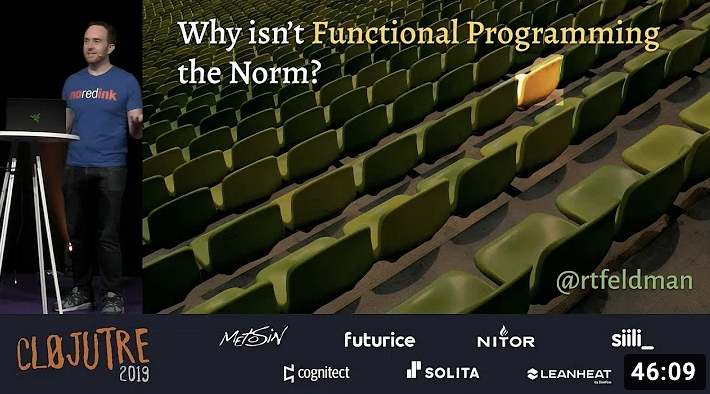


This video is the shortest road to truly understand Object Oriented Programming. Robert C. Martin (Uncle Bob) explains a group of professionals how the concepts that they already know (inheritance, encapsulation, polymorphism) are mainly a way to manage the dependencies in your code.

Jim Keller Moore’s Law, Microprocessors, and First Principles
Jim Keller is a legendary microprocessor engineer and talks about his work at AMD and Intel. He talks about the basic tasks of any computer and how modern processors handle these tasks. Jim Keller says we should re-build more often instead of trying to change old systems.

Agile is Dead, Pragmatic Dave Thomas
People are looking for good ways to manage projects since forever. About 20 years ago, Dave Thomas and other software engineers got together and made the Manifesto of agile Software Development. Dave talks about how the name agile is mis-used and how a simple concept of “Taking a step, evaluate and adjust” turned into an industry that spreads fear and ask us money to take away that fear. After watching this video, you think differently about words like “Certified tester” and “Scrum Master Training”. If you are already a professional Scrum-Hater, skip this video and see One Hacker Way Rational alternative of Agile - Erik Meijer, where Erik Meijer talks about the dark side of Agile.

John Romero talks about creating Commander Keen, Doom and Quake and how four guys pushed the limit of processors and graphics to set the standard for games in the nineties. John shows a couple of principles of id software like:
No prototypes. Just make the game. Polish as you go. Don’t depend on polish happening later. Always maintain constantly shippable code.
John Carmack, the programming brain behind id software, talked about game development and technology. If you are interested in 60 minutes of technology innovation (in 2004), this might be a good video for you.

If you are a programmer, it is impossible to not know StackOverflow. Learn how Jeff Atwood (with Joel Spolsky) got the idea to create the Question and Answer site that is used by millions of programmers. Jeff talks about the challenges of working together of software and how communications plays a huge role in this.

Modern programming languages support multiple programming paradigms. OOP is usually among them. Why is OOP so popular? Richard Feldman gives a fantastic overview of the history of programming languages and what makes a language popular. Feldman looks at popularity factors like syntax, learning curve and the community and breaks the talk up in three main parts: Language, Paradigma and Style.